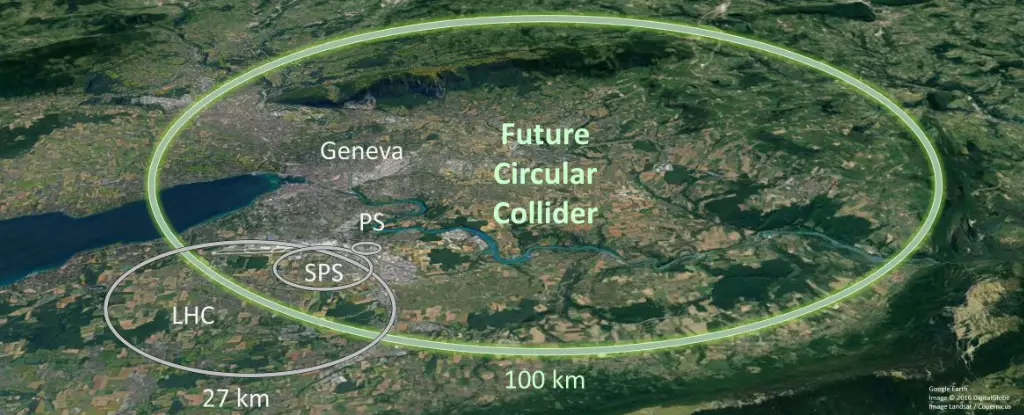CERN’s proposition for a new particle collider, the Future Circular Collider (FCC), brings forth a vision that transcends mere scientific inquiry—it embodies an ambition that some argue is akin to the monumental projects of ancient civilizations. With a projected cost of approximately $17 billion, proponents assert that this mega-scientific undertaking is crucial for maintaining Europe’s preeminence in fundamental physics. Fabiola Gianotti, CERN’s director-general, has not minced words, warning that Europe faces stiff competition from emerging superpowers like China, thereby framing the FCC as a necessary step for sustained leadership in global scientific dialogue. The essence of this project—the exploration of the universe’s fundamental building blocks—promises to redefine our understanding of physics much like its predecessor, the Large Hadron Collider (LHC), which confirmed the existence of the Higgs boson.
However, the cost and scope of the FCC raise significant ethical questions. Are we, as a global community, willing to invest such vast resources into a scientific endeavor that, while articulated as evolutionary, may ultimately be speculative in its findings? The argument stretches beyond the realm of mathematics and physics into societal considerations—could that money instead be allocated to pressing issues such as climate change, health care, or education?
Criticism and Controversy: The Price of Progress
The ambition of the FCC has not only sparked excitement among physicists but has also ignited fierce opposition among environmentalists and local communities. Critics argue that this “pharaonic” endeavor will lead to detrimental ecological repercussions and financial misallocations, with arguments stemming from respected figures such as physicist Olivier Cepas, who contends that the extensive resources could yield more impactful scientific advancements across less grandiose projects. While CERN officials attempt to mitigate these concerns by claiming that 80% of the FCC’s costs might be covered through existing budgets, skepticism remains understandable, especially when public trust is already fragile due to the legacy of colossal, underfunded initiatives.
In Roche-sure-Foron, France, dairy farmer Thierry Perrillat articulates the palpable fear among residents that their lands will be requisitioned to accommodate the sprawling infrastructure needed for the collider. The sentiment extends further when local environmental groups criticize the project’s projected energy consumption and overall climate impact. The disagreement over the FCC’s feasibility mirrors not just a scientific debate but a cultural clash between man’s relentless pursuit of knowledge and the tangible realities of resource allocation and land preservation.
Community Voices: The Local Dilemma
Events in nearby communities echo urgent concerns. Public forums and town meetings reveal a growing unease, particularly among residents who feel the burden of this ambitious project will fall disproportionately on their shoulders. Organizers from environmental groups are challenging the narrative of progress heralded by CERN, instead calling for critical introspection into what constitutes worthy investment in light of our planet’s deteriorating health. Thierry Lemmel, involved in organizing local discussions, raises a compelling question: “Given the state of the planet today, should we really be mobilizing so many resources, so much wealth for this project, with uncertain results?”
This conflict embodies a struggle between collective aspirations and individual fears. Residents are faced with the dilemma of whether their community’s economic growth, touted by some local leaders like Ferney-Voltaire’s Mayor Daniel Raphoz, weighs more heavily than their agricultural heritage and local ecosystems. The back-and-forth of emotions engenders a broader debate about the true cost of scientific advancement versus the preservation of local livelihoods.
Broader Implications for Scientific Inquiry and Choice
The FCC’s contentious discourse encapsulates an essential dilemma faced by modern society: the balance between scientific ambition and socio-ecological responsibility. Are we so enamored with the grandeur of discovery that we overlook the cost of those pursuits on humanity? Just as the pyramids of ancient Egypt served a purpose but at an incredible human cost, so too must we scrutinize whether the benefits of the FCC outweigh its consequences. The urgency of climate action frightens many into questioning whether such enormous scientific enterprises should prioritize immediate community impacts over the thirst for deeper understanding of our universe.
The FCC project promises transformative revelations about the cosmos, yet the narrative surrounding it must evolve past mere technological milestones to encompass a wider philosophical conversation about science’s role in society. Ultimately, as debates simmer about the FCC, they reflect a larger truth about how humanity chooses to reconcile its desire for knowledge with the moral imperatives of our time. What remains clear is that decisions made about projects like the FCC resonate far beyond the walls of research institutions—they reverberate into the very fabric of our communities and the health of our planet.

Leave a Reply